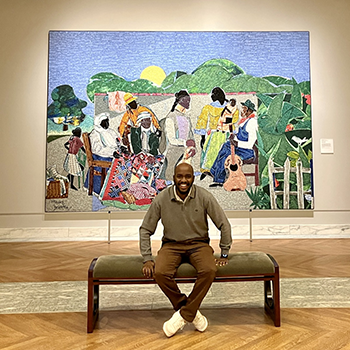Alumnus Voice: My Spartan experience as an international student
July 13, 2023 - Bevertone Anyonga
Bevertone Anyonga graduated from James Madison College in 2020 with a degree in comparative cultures and politics, and international relations. Anyonga was a Mastercard Foundations Scholar and currently works for Michigan State University’s Institute for Public Policy and Social Research as an education program coordinator. He is originally from Kisumu, Kenya.

Being an international student studying in the U.S. means you must become very familiar with immigration law as you navigate this system that requires you to prove your intentions at every turn. The ongoing process can be daunting, from university admission to obtaining internships to applying for jobs. The critical factor was realizing I was not alone; others had done it before and would do it after me.
Learning to ask for help and extending it to others when they were in need became a regular part of the international student experience. We must work much harder to have a place here, but I wouldn’t do it differently.
Studying at a Big Ten campus means there are opportunities for students to engage in their interests through research, clubs and activities. As big as this campus is, finding community is guaranteed. There’s so much here — it would be impossible not to find your people.
Choosing to study in a residential college such as James Madison College made finding a community within my academic interests even more seamless. The small class sizes encourage conversation with your colleagues both in the classroom and outside. The professors greatly care about student success and are invested in helping you achieve and improve — special shoutout to Professors Das Gupta and Flaim for their mentorship.
The support offered by the college is unmatched, from having a field experience coordinator and career services counselor in the college, whose offices are steps away from where most of my classes met, to onsite writing support. The advantages of living in the same building as most of my classes were numerous, especially during the winter!
Although I am forever grateful to my friends who brought me home with them and showed me love, during breaks and holidays, homesickness is real. The opportunities to return to Kenya were very infrequent. Some of the holidays I celebrated from birth were suddenly unrecognized, and the number of time zones between family would only compound this lonely feeling.
And while learning the language was not a hurdle, as I have spoken English all my life, proving my English-speaking skills was not something I anticipated. Additionally, making sense of all the idiomatic expressions, accents and slang was a barrier I had not expected.
And then, of course, there was the adjustment to the food here and social prejudices. Navigating being Black and foreign during the Trump presidency compounded common misconceptions and ignorance that led to stereotyping. I was experiencing a DuBois-style double consciousness in real-time. These challenges pushed me in ways different from what I previously experienced studying away from home at a boarding school.
The diversity of the student body in the residential setting is like a microcosm of the entire campus. Having this on a smaller scale helped make acclimating easier. And while I did take advantage of clubs outside of the college, like rugby and sailing, having the residential college community to fall back on for allyship and day-to-day activities meant that I always had a least one person that understood me better. Your friends become your family, and that has been one of the best gifts I’ve received.
During my senior year, I interned with the Community Economic Development Association of Michigan (CEDAM), a statewide nonprofit trade association in Michigan. The experience changed my perspective about what I wanted to do after college. I decided that getting involved in state politics and local government, especially housing as a health crisis, was what I was passionate about. After graduating, I took on a full-time role at CEDAM as a program coordinator, continuing to work on learning and development programs geared towards training and engagement in the various community economic development areas.
In a slight shift away from direct advocacy, I had the opportunity to redesign internship and economic development 101 programs, develop and support statewide economic inclusion initiatives, improve the organizational capacity of member organizations to help in-service delivery through the AmeriCorps program, and much more.
In my current role as an educational program coordinator for IPPSR, here at Michigan State University, I work on health policy, integrating racial equity into IPPSR programs. I regularly work on research policy-based projects surrounding these topics and continuously educate Michigan legislators and policymakers through our various programs. I am working on a report titled "Making The Political Case For Racial Equity."
I have been able to hone these interests early in my career and positively impact my community. While my goals are relatively open at this time, I would like to continue working in state politics, and I am always interested in ways to give back to my country and community in Kenya.

